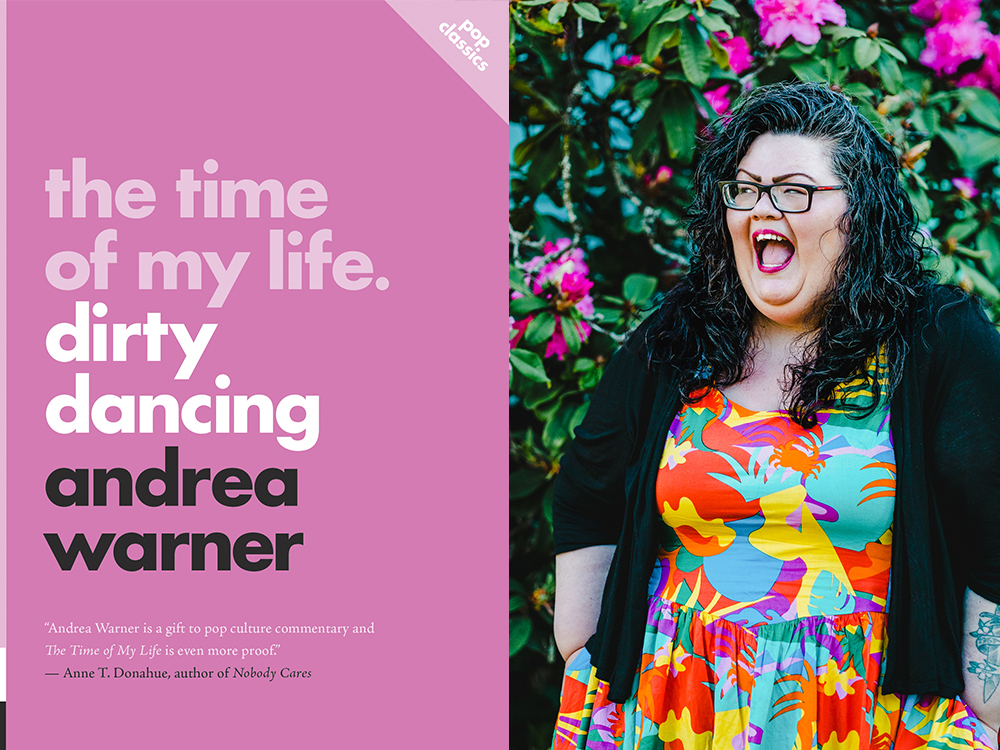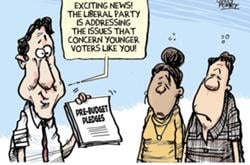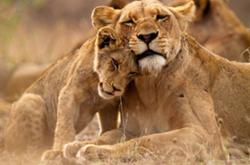Andrea Warner was nine years old the first time she saw the movie Dirty Dancing. But it took a few years and a few watches for her to realize how central abortion is to the plot.
“I was maybe late high school, and definitely when I got to university, when I really fully clocked into it being an abortion film,” Warner, a Vancouver-based pop culture journalist and author, told The Tyee.
But readers of Warner’s new book, The Time of My Life: Dirty Dancing, the latest in ECW Press’s Pop Classics series, won’t miss reproductive health care’s importance to the plot.
“Dirty Dancing is an abortion movie,” Warner writes to open the book’s fourth chapter. “Yes, ‘dirty’ and ‘dancing’ are in the title, and dance is the medium through which our leads fall in love and ultimately find their own liberation, but it’s the pressing need for an abortion that drives the action.”
The 1987 classic stars Jennifer Grey as the teenage Baby, who falls for Johnny (Patrick Swayze), a working-class dance instructor at the resort where Baby is vacationing with her family.
When considering whether to pitch ECW Press on a book, Warner had to think critically about why this movie can’t be put in a corner.
“I started to analyze what was so good about Dirty Dancing, and why I want to watch that more than, say, Footloose, or almost any other film that has teens dancing as the main foundation; I started to figure out the pieces of it that made it so special,” Warner told The Tyee. “And that is the abortion, the stuff around class.”
The Tyee spoke with Warner earlier this month about her new book, abortion access, dance films, soundtracks, racism and why Dirty Dancing haters should read her book. This interview has been edited for length and clarity.
The Tyee: How did this book come about?
Andrea Warner: It was pandemic times, and I had finished up a first draft of Rise Up and Sing, my first book for middle readers, which was research-heavy. I had good momentum and didn’t want to lose that. My friend Hannah McGregor had just pitched ECW and had sold her book about Jurassic Park to Pop Classics. I thought about what makes sense for me to spend 30,000 words on, that would be a little bit research, but a little bit more memoir and personal writing than the previous book had been. And so I pitched Jen Sookfong Lee at ECW this Dirty Dancing idea, and she was really enthusiastic.
It ended up that my book is out before Hannah’s, but Hannah’s is out in the fall. I’m hoping we can do a double screening of our films together. We’ve joked about it being like a Wayne Knight double bill because he happens to have roles in both films.
Dirty Dancing is set in the ’60s, shot in the ’80s, and yet has so many parallels with today. How does the abortion plot line hit you now?
It’s both really depressing and weirdly validating. When I was younger, I didn’t think a lot about whether I would ever have to worry about my access to reproductive health and justice. Rock for Choice was a significant event I attended in my late teens, early 20s. I had a bit of an inkling that we had to maintain the fight. But I felt so smug and sure that it was fine. We’d seen a lot of extremist, far-right activities and anti-abortion violence; that’s what I thought I was protesting. I didn’t think I was there as part of a group of people who were trying to ensure we had legal rights to this, because I was so naive.
I am sickened that the plot is so relevant today. And also so grateful that it exists as this enduring piece of our pop culture that has always known our grasp on this is tenuous. Dirty Dancing is about more than just a summer fling or learning to dance. This movie was telling us that abortion is health care, and everyone deserves access to health care.
What are people who dismiss this film as a “woman’s movie” missing out on?
Good taste. It’s a much bigger issue than Dirty Dancing: when you think of something as a woman’s movie, piece of art, book or whatever, and you can’t see the much larger human story, I feel a lot of pity for those folks. We’re talking about a gender binary here, which is also very useless and old. But that’s what the movie is.
Dirty Dancing plays with a lot of gendered expectations around machismo with Patrick Swayze’s character, Johnny, and I think Swayze makes him a much more complex character than he had to be. Yes, he’s a “bad boy.” But: he is obviously working poor; has experienced a lot of objectification; his work ends up conflated with sex work. He talks a lot about his vulnerability, never feeling good enough or like he has the agency to do what he wants, which is dance.
Baby, as well, there are some power dynamics that shift between them, but they’re always equal partners. And the movie makes a lot of space for the relationships between the women characters that are entirely rooted in familial, friendship and community aspects. The idea that this movie is just a woman’s film is really missing a lot of the gifts that are in it.
You write about the pushback Eleanor Bergstein, Dirty Dancing’s writer and producer, got from studio executives: no one expected Dirty Dancing to do well. But it did. Still today, films focusing outside of cis male, hetero, whiteness receive a lot of pushback. Why do you think mainstream film studios haven’t got the message yet?
Because it still wants to treat everything that is outside white, male, cis, hetero as an anomaly. They’re still making, investing and betting on themselves: white, cis, hetero men. They don’t want to lose power. Until people are ready to really contend with not being the most powerful, and we are thinking more about equality and equity, that’s not gonna happen.
At the Oscars this year, the writer and director of American Fiction suggested instead of making one movie that’s $20 or $40 million, make 10 movies that are $4 million. And invest in projects highlighting and celebrating people outside the very specific, small criteria of straight, white, male, cis. There’s like a sizable contingent within the filmmaking industry that are extremely invested in that, because that’s the only way they’re going to be able to enact their creative visions. Those are the people I’m really excited about.
Did you see the movie Rye Lane?
No.
It is one of the best romantic indie comedies I’ve ever seen. It didn’t have a huge budget. It was made in London; the leads are two phenomenal young Black actors. It’s brilliant. Those things are happening in the world. Making time to find them is one of the pieces of work we get to do and tell each other about.
You don’t let Dirty Dancing off the hook for the racism of using Black and Latino dance and music for a nearly all-white cast. These forms of dancing — shaking your hips, moving your butt — aren’t necessarily scandalous in other cultures. Why do we still view this kind of dancing as “dirty”?
Well, we’re pretty limited sexually. If you think about how so many parts of North America still believe abstinence-only education is the way to go, of course we’re not going to have healthy attitudes towards sex and dancing.
We are fine with selling sex in advertising and film, but we’re very anti-sex work. We have super screwed up ideas about sexuality. Any bodily freedom people might be figuring out for themselves, we see a lot of people try to weaponize that.
There’s so much fear around pleasure, and so much wilful misunderstanding around enthusiastic consent. That is one of the only ways to move forward, if everybody gets to exist healthfully, with their own strengths and their own agency. There’s a lot of people that are really scared by that, and unfortunately, they’re very loud and still quite powerful.
You write in the book about how you have always been a fat person who loves to dance. How does that experience relate to your love of Dirty Dancing?
I would have obviously loved to see some fat representation in Dirty Dancing. But there was very little positive fat representation anywhere in pop culture when I was a kid, so I always found other ways to relate. What I saw in Baby’s dance journey was the possibility of working hard at something, learning it and never giving up. Her tenacity was really inspiring and the film never shies away from the hard work that it takes to perfect just one routine. She’s not becoming a professional dancer in any way. She’s pouring herself into one routine and she doesn’t do it perfectly, but she does it well enough that she feels proud of herself. I took a lot from that.
That said, I’ve literally never wanted to perform a dance routine in public, so dance isn’t something I’ve “worked at.” But it’s remained something I love to do and I do it just for me because it feels good to move my body. And I just can’t resist being a tremendous idiot on the dance floor; I love it.
How does Dirty Dancing compare to films about young people dancing released since 1987?
I love seeing a scrappy group of people come together and put on a show, that’s one of my jams. Usually dance is its own art form in these films; but it also ends up being like a metaphor for so many other things. I really like that.
The Magic Mike trilogy is fascinating to me. I really like that it celebrates the creativity, the hard work, the physicality of what they’re doing, and shows the work. One of the things I love so much about dance films in general is they show how much work people are putting into it.
An older dance movie from the late 2000s that Rutina Wesley starred in, and I think it’s Canadian: How She Move. I really loved that. I still think about it to this day.
I find something very compelling about the intimacy of dance. Not being scared of intimacy is one of the weird enduring legacies of Dirty Dancing that I haven’t really put into words before. It takes intimacy for Baby to confront her father; for her and her sister to find this like tiny piece of common ground together; for her to go to Johnny and say what she needs from him.
There’s a fearlessness when we take those emotional risks. The intimacy that Baby and Penny develop: it’s really meaningful to watch them have that moment together before Baby goes to dance and Penny goes for her abortion. I love that the movie makes spaces for and values showing us different kinds of intimacy.
Dirty Dancing is a romance, too. I found myself turning to romance novels for the first time as an escape during the pandemic. The genre is not new, but it feels like there’s been somewhat of a renaissance recently. Do you feel that too?
I think so. I’ve heard many more friends be very open about the fact that they’re reading romance novels. There used to be a lot of shame around it, because again, it’s women’s stuff, all that gendered nonsense. People have such limited understanding of all the different things you might get from romance novels that have nothing to do with masturbation. I want everyone to be masturbating if they want. But I feel like romance novels were this dirty little secret that people are now refusing to let it be treated as such. And I love that for folks.
I do have a fondness for very specific and highly niche romance novels, because I think they’re so interesting and tell us so much about the cultural norms that have evolved. I have one, Oh, Baby! by Lauryn Chandler, that I keep in my car because it’s a conversation starter. It is specifically about women getting pregnant, being pregnant or trying to get pregnant. Romance novels have something for everyone. And there are so few genres that truly embrace the vast spectrum of emotional curiosity.
Your book also covers the success of the Dirty Dancing soundtrack. The last film soundtrack I loved came out in 1997. Is the big movie soundtrack still a thing?
It’s still a thing. But I would agree with you that the ’90s and 2000s were really peak soundtrack times. The Romeo + Juliet soundtrack, I still think it is one of the best ever. Usually Wes Anderson is a guaranteed soundtrack guy; Guy Ritchie films are typically big soundtrack; Quentin Tarantino, big soundtrack guy. We’re still seeing that periodically.
More and more we’re seeing one artist’s songs repeated in films, or an artist and a director collaborate. We’re seeing more instrumentals, as well; a literal composition soundtrack instead of a series of songs. Maybe it got more expensive to use certain songs in films. It’s really hard to say what has led to the change. It probably reflects the different ways that we listen to music now.
We’re seeing really incredible soundtracks on TV. Like even as Killing Eve, as a TV show, fell apart, the soundtrack was still incredible.
Yeah, I just watched Beef. So much to love about the show — but that soundtrack!
And the soundtrack to The Brothers Sun: oh my God, it’s so good. Even a show like Insecure or Atlanta or Betty, all of them had these incredible soundtracks. There’s a lot of really cool stuff happening in television and streaming soundtracks, and maybe that takes over from film a little bit.
Who should read this book?
If you are like “Oh, I’ve never liked Dirty Dancing,” I desperately want you to read this book. I would love you to think about what it is that you think you don’t like about Dirty Dancing. I like it when someone challenges me to think about why I don’t like something.
Obviously, I would also love people who adore the movie to spend some time with me and my thoughts around it. The things that I love, they’re not above criticism. The way that we love something more deeply is to engage with its flaws, talk about those flaws and spend time in the critique. It’s really important that all the stuff we love still gets to be held to account. Just like ourselves and all the people we love, we all get to be held to account. ![]()
Read more: Books, Gender + Sexuality, Film

















Tyee Commenting Guidelines
Comments that violate guidelines risk being deleted, and violations may result in a temporary or permanent user ban. Maintain the spirit of good conversation to stay in the discussion and be patient with moderators. Comments are reviewed regularly but not in real time.
Do:
Do not: